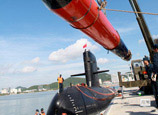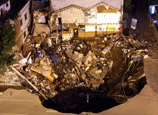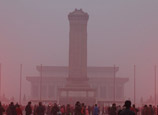
WASHINGTON, Jan. 29 (Xinhua) -- U.S. Senate on Tuesday approved Democratic Senator John Kerry as the next secretary of state, who is set to replace Hillary Clinton.
The Senate confirmed Kerry's nomination in a 94-3 vote, hours after the chamber's Foreign Relations Committee approved his nomination. Kerry has chaired the committee himself for the past four years.
"Senator Kerry will need no introduction to the world's political and military leaders and will begin Day One fully conversant not only with the intricacies of U.S. foreign policy, but able to act on a multitude of international stages," said Democratic Senator Bob Menendez at the Senate, who serves as the chairman of the Senate Foreign Relations Committee.
Senator Bob Corker, the top Republican on the same committee, praised Kerry's testimony on Thursday and called him "a realist" in dealing with world affairs.
At the Senate Foreign Affairs Committee earlier the day, Kerry appreciated the praises from his colleagues.
"I'm honored beyond words," he said. "What a privilege to work with you and now to work with you in a different way. I thank you very, very much."
Kerry is expected to be sworn in this week, as Clinton will leave her job on Friday.
A senator from the state of Massachusetts, Kerry was nominated by U.S. President Barack Obama on Dec. 21 as the next chief diplomat of the United States.
Kerry offered support to Obama's re-elections, and acted in preparation for his debate with Mitt Romney, the president's Republican rival.
In the nomination ceremony at the White House, Obama highly valued Kerry's rich experience in foreign policy, saying "few individuals know as many presidents and prime ministers or grasp our foreign policies as firmly as John Kerry" and calling him the "perfect choice" to guide American diplomacy in the years ahead.
Kerry, 69, won a Silver Star, a Bronze Star and three Purple Hearts for his service in Vietnam from 1968 to 1969. After returning home, he became an anti-war hero.
First elected to the Senate as a representative of Massachusetts in 1984, Kerry is serving his fifth term in the chamber. He was elected to chair the Senate Foreign Relations Committee in December 2008 after chairman Biden was elected vice president.
Kerry launched a bid for the White House in 2004 but lost to then incumbent George W. Bush by a margin of 34 electoral votes.
As a reliable emissary of the administration, Kerry also went to talk Afghan President Hamid Karzai into agreeing to a run-off presidential election in 2009.
And in 2011, he secured the release by Pakistan of a CIA contractor accused of killing two Pakistanis as well as the return of parts of a U.S. stealth helicopter which crashed in an operation inside the South Asian nation in which al-Qaida leader Osama bin Laden was killed.
Kerry was Obama's favorite for the job as secretary of state in 2008 before the president selected Hillary Clinton, his rival in the contest for the Democratic presidential nominee.
The nomination of Kerry had become certain after Susan Rice, the American ambassador to the United Nations and Obama's top choice for secretary of state, withdrew over her controversial statements about the Sept. 11 attack on the U.S. consulate in Benghazi, Libya last year, in which four Americans, including Ambassador Christopher Stevens, were killed.
Some Republican senators have vowed to block Rice's nomination over her initial description of the attack as one arising from a spontaneous protest over an American-made anti-Islam film, accusing her of trying to mislead the American people. The Obama administration later acknowledged that there was no protest and the assault was a terrorist attack.
Kerry is not seen as part of Obama's inner circle, a fact that casts doubt about how much influence he can wield over foreign policy making in the administration.
Kerry insiders reportedly said that as top American diplomat, Kerry would like to play a big role in shaping policies for the Middle East and promoting peace between the Israelis and the Palestinians.
He will head a department beset by limited funds and rising security costs overseas, and also an agency of which the image has been tarnished for failing to provide adequate security to its diplomatic post in Benghazi.
















 'Joint effort' urged to clear the air
'Joint effort' urged to clear the air


![]()
